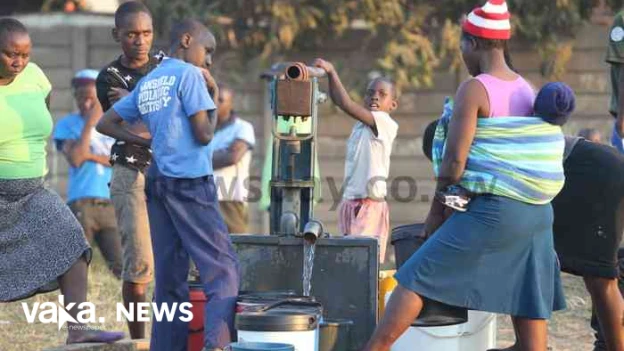77 boreholes drilled in cholera hotspots
- Category: General

- By Admin
The Government has drilled 77 boreholes in cholera hotspots across the country out of a target of more than 140 as it steps up efforts to fight the deadly water-borne disease through increased access to clean water.Over 300 more people are thought to have died from the disease since it first surfaced last year, adding to the 71 confirmed deaths from the cholera outbreak that the nation is currently dealing with.Additionally, the illness is wreaking havoc in a number of nations in the region.According to government numbers, as of January 17, Zimbabwe had reported 18 865 suspected cases of cholera, 2 223 confirmed cases, and 12 137 recoveries.In an effort to save lives, the government has quickly triggered its rapid response mechanisms, and this week it will accept the delivery of a consignment of almost a million cholera vaccinations in advance of the start of a national vaccination campaign that is scheduled to begin next month.
The International Coordinating Group (ICG) has provided the government with about 2.2 million doses of the oral cholera vaccine (OCV), which will be administered in batches. This was arranged in close collaboration with development partners and through the Ministry of Health and Child Care.
The government has also intervened to keep an eye on public gatherings such as funerals, which are thought to be super-spreaders of cholera. Since then, it has directed the public to report any reported fatalities in the community that are linked to diarrheal causes so that prompt action can be taken.
As part of the containment efforts for water-borne diseases in both rural and urban regions, the Zimbabwe National Water Authority (Zinwa) has been authorized to increase the water quality assurance tests in addition to fast-tracking borehole digging.
According to Mrs. Marjorie Munyonga, manager of corporate communications and marketing at Zinwa, the organization has increased efforts to guarantee that everyone in the public has access to safe water.
"As part of the ongoing fight against the current cholera outbreak, Zinwa has drilled 77 boreholes around the country to help alleviate the water and sanitation situation of communities," the spokesperson stated.
"In cholera hotspots like Harare, Glendale, and Mapanza in Chiredzi, boreholes are being drilled at institutions like clinics, hospitals, schools, and villages, and they are being equipped with solar systems and bush pumps."
The project supports the 35 000 boreholes that the Presidential Borehole Drilling Scheme, which was launched in 2021 to increase communities' access to water, is aiming to drill throughout the nation's villages.
Some of the communities that have already benefited from the program are those in Binga, Matabeleland North, and Mangwe, Matabeleland South.
Mrs. Munyonga reported that 38 boreholes had been drilled in Harare, 33 in Manicaland, three in Mashonaland West, and two in Masvingo province as part of the cholera mitigation initiatives, with more expected in other regions of the nation.
More boreholes are being drilled across the nation; as of January 17, 2024, at least 140 boreholes had been assessed and were prepared for drilling.
In the areas where it supplies drinkable water, "the authority has also put in place a raft of measures and strategies to help prevent the outbreak and spread of cholera," the spokesperson stated.
In order to minimize disruptions to water supply, Zinwa has stocked up on water treatment chemicals for small towns, growth points, and rural service centers where it serves water, according to Mrs. Munyonga.
Zinwa has emphasized the necessity of ensuring that there are as few disruptions to the water supply as possible in the areas where it provides potable water, as access to clean water is thought to be one of the key mitigation measures against cholera.
According to Mrs. Munyonga, "all water supply stations are adequately stocked with at least three months' worth of water treatment chemicals." In order to ensure that all treated water is put through frequent and stringent testing at different stages of production and distribution, as well as to speed up its response time to malfunctions, the authority has also reinforced its water quality assurance role.
"Zinwa is also reducing station downtime by stockpiling critical plant spares."
Mrs. Munyonga stated that in the battle against cholera at the provincial and district levels, Zinwa Catchment and Service Center offices collaborate closely with important government institutions.The authority has also strengthened its role in water quality assurance to guarantee that all treated water is subjected to frequent and rigorous testing at various stages of production and distribution, as well as to accelerate its response time to malfunctions.
"Zinwa is also reducing station downtime by stockpiling critical plant spares."
Mrs. Munyonga said that the Zinwa Catchment and Service Center offices work closely with significant government institutions in the fight against cholera at the province and district levels.This water-borne illness can be fatal and results in severe dehydration and diarrhea. The illness can be fatal in a matter of hours if left untreated and affects both adults and children.
Experts in health say that while the bacteria that causes cholera remains present in human feces for 1–10 days after infection and can spread to other people, most infected individuals do not show any symptoms.
As part of the steps to mitigate cholera, health experts have urged the public to maintain high standards of hygiene. Meanwhile, the Ministry of Primary and Secondary Education has adopted standard operating procedures that include the requirement that all schools have flowing water.






